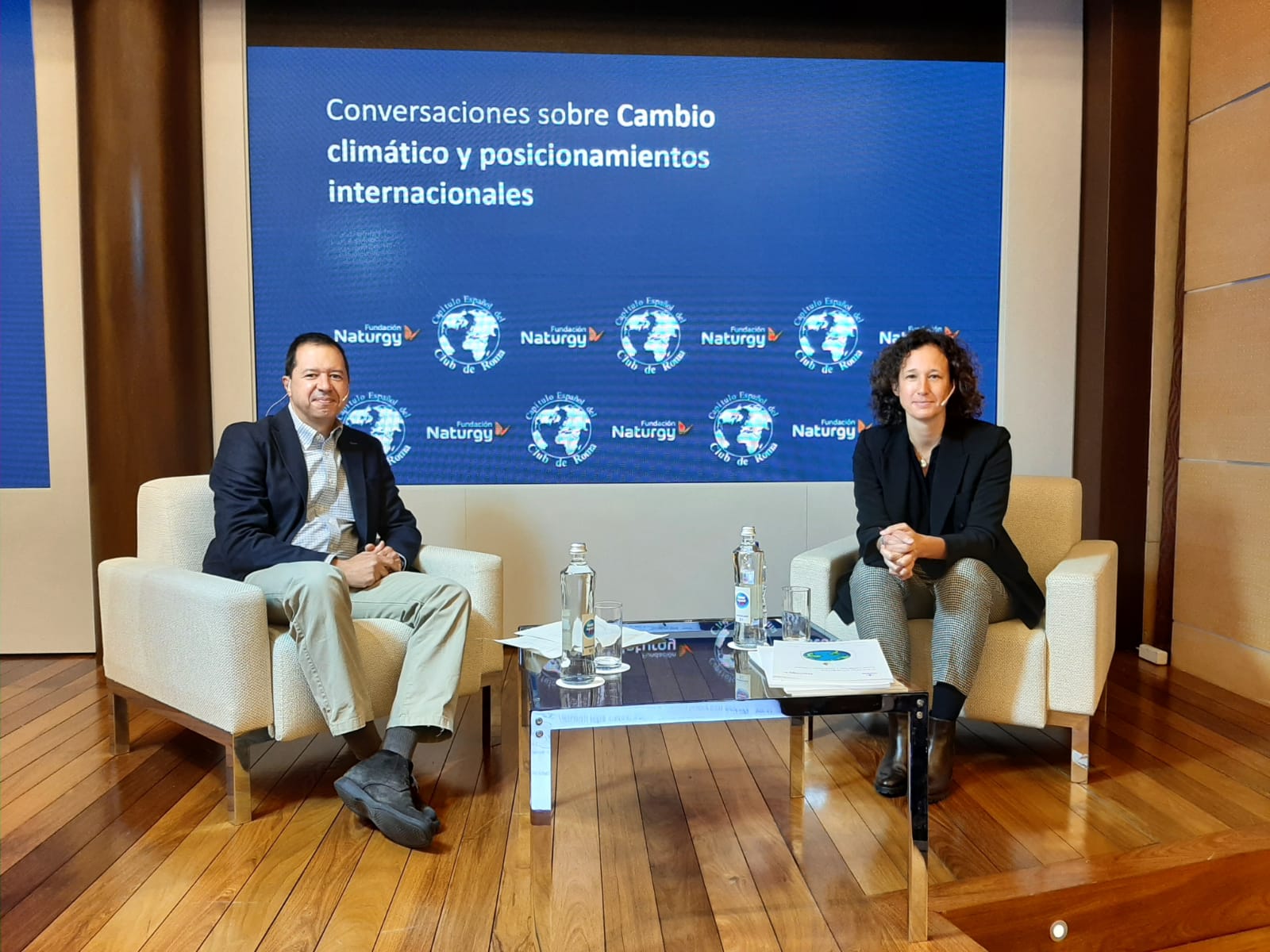Climate ambitions, an agreement on emissions accounting and participation by the United States will be the key issues addressed at the forthcoming COP26 in Glasgow.
The Naturgy Foundation and the Spanish chapter of the Club of Rome are holding a series of webinars to reflect on and debate current issues related to energy and sustainability, with a session on the forthcoming Climate Summit that will be held in November.
Valvanera Ulargui, director general of the Spanish Office for Climate Change, and Pedro Linares, professor at the Higher Technical School of Engineering ICAI-University of Comillas, were the first guests in this series of conversations between experts.

Today the Naturgy Foundation and the Spanish chapter of the Club of Rome held a webinar on the different international stances on the climate challenge and the forthcoming Climate Summit in Glasgow. Valvanera Ulargui, director general of the Spanish Office for Climate Change, and Pedro Linares, a professor at the Higher Technical School of Engineering ICAI-University of Comillas, took part in the webinar. Julio Lumbreras, professor at the Polytechnic University of Madrid and Harvard University, also participated.
Valvanera Ulargui stated that, after the climate ambition mandate set at the Madrid summit, “we have to leave Glasgow with an accounting mechanism for transactions in carbon markets” and, above all, with an agreement that “doesn’t freeze ambition or frustrate expectations.”
Pedro Linares emphasised the importance of the United States returning to work alongside climate change objectives because “it changes geopolitics and could potentially encourage other agents to join the bandwagon.”
Ulargui explained that “Europe has led on climate change policy and strategy over the past four years” and that, following the Covid-19 healthcare crisis, “the pandemic hasn’t pushed environmental objectives into the background; the world is committed to green transformation and the European Green Deal has played an important role in this area.”
Climate agenda at the G20 and G7
She also highlighted how important it was that the G20 and G7 summits to be held this year will decisively include the climate agenda. “Political leadership will now be gauged by climate ambition,” stated Ulargui.
Linares affirmed that “there are increasingly close links between climate and commercial politics,” and Ulargui added that “the next big step is for the WTA to promote trade as a tool that supports climate change.”
Both Linares and Ulargui emphasised the importance of sector-based plans so that large-scale global objectives can be determined, come to fruition and be measured. Ulargui commented that the private sector has a high level of awareness because she has seen clear evidence of competition across the green agenda.
The two climate change experts agreed that another key area that needs further work is increasing sustainable financing.
The webinar was introduced by María Eugenia Coronado, director general of the Naturgy Foundation, who underscored the need to persevere with debating and understanding the causes and implications of climate change because “it is and will be one of the greatest risks and challenges faced by humanity, affecting both today’s and future generations.”
José Manuel Móran, deputy chairman of the Spanish chapter of the Club of Rome, recalled the Club of Rome’s commitment to sustainability since its creation in 1968 and “its active participation in defining policies and programmes that help to provide an appropriate response to the climate crisis, spreading information about good practices and developing solutions that speed up the decarbonisation of civic life, and production and mobility systems.”
“Neither alone nor in silos”
Professor Julio Lumbreras explained that to adopt effective solutions to the climate change crisis, “a complex, global problem that requires urgent action”, what is needed is “a transformational change brought about by close, continuous collaboration between different parties: companies, research centres and universities, governments and civil society.” He summarised it as: “Neither alone nor in silos.”
Lumbreras, who coordinated the recent Naturgy Foundation publication ‘Climate Change. Scientific bases and debatable issues’, explained that “a degree of climate change seems to be inevitable and it is necessary to develop adaptation strategies to cope with the foreseeable and unavoidable impact”.
He maintained that “it is scientifically proven that global warming will persist for millennia; adaptation will therefore not only have to be maintained for a long period of time, it will probably be a ‘new normality’ for the lives of future generations.”
The Naturgy Foundation and the Club of Rome
Today’s webinar was part of a series of conversations between experts on current issues related to energy, the environment and sustainability launched by the Naturgy Foundation with the Spanish chapter of the Club of Rome.
Share